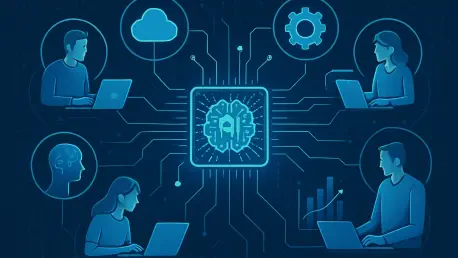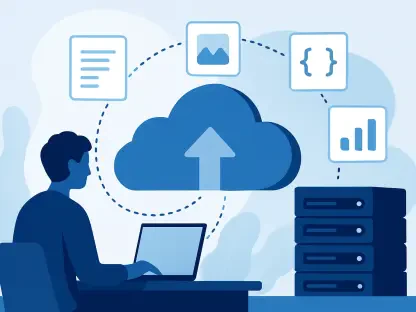In an era where data drives decision-making, the ability to harness advanced artificial intelligence (AI) and machine learning (ML) tools has become a game-changer for companies worldwide, yet the complexity and cost of these technologies often place them out of reach for many. Enter a pioneering platform that is breaking down these barriers by offering a decentralized approach to AI-driven data analysis. This innovative system connects global firms with top-tier data scientists and modelers through a secure, user-friendly interface. By decentralizing access to cutting-edge AI/ML capabilities, it empowers businesses of all sizes to leverage powerful insights without the prohibitive costs of building in-house teams. Moreover, it ensures that data scientists retain control over their intellectual property while monetizing their expertise. This model not only fosters collaboration but also sets a potential blueprint for the future of data analysis on a global scale, making advanced tools accessible to a broader audience.
1. Pioneering Decentralized AI Solutions
The rise of AI and ML has transformed how businesses interpret vast datasets, but accessing these technologies often requires specialized knowledge and significant financial investment. A unique platform has emerged to address this challenge by offering a decentralized marketplace where companies can tap into elite AI talent. This system simplifies the process of matching data-driven projects with skilled modelers who can provide tailored solutions. Security remains a priority, as data can be protected through obfuscation techniques, ensuring privacy for sensitive information. By creating an ecosystem that benefits both firms seeking analysis and independent data scientists, this platform is redefining how advanced data tools are utilized across industries. The impact is already evident, as businesses gain access to high-level expertise without the overhead of permanent staff.
This decentralized approach also champions innovation by allowing modelers to work on diverse projects while maintaining ownership of their creations. Unlike traditional models where intellectual property might be transferred, this platform ensures that data scientists can continue to refine and repurpose their work for future endeavors. For companies, this means access to a dynamic pool of talent that is motivated to deliver high-quality results. The structure encourages competition among modelers, driving better outcomes for businesses seeking actionable insights. Additionally, the cost-effectiveness of this model makes it an attractive option for small and medium-sized enterprises that might otherwise struggle to compete with larger corporations in the AI space. This democratization of technology is leveling the playing field and fostering a more inclusive environment for data-driven decision-making.
2. Simplifying Big Data Analysis Through a Structured Process
Handling massive datasets can be an intimidating task for many organizations, but a streamlined six-step process makes it manageable and efficient. First, companies or individuals upload their data to a secure platform, with the flexibility to mask sensitive details for privacy. Next, a central foundation hosts this data, ensuring it is accessible to a network of model developers known as Crunchers. The foundation then initiates a new analysis project based on the provided data. Following this, Crunchers design and submit AI models tailored to the specific dataset. The foundation manages all development operations, infrastructure, and computing resources to support the process. Finally, rewards are distributed to Crunchers based on the accuracy and value of their model predictions, as determined by the data providers. This structured approach ensures clarity and efficiency at every stage.
The beauty of this system lies in its ability to connect diverse stakeholders in a seamless workflow. Companies benefit from access to cutting-edge AI models without needing to understand the intricacies of model development. Meanwhile, Crunchers are incentivized to deliver their best work, knowing their efforts are directly tied to tangible rewards. The management of technical infrastructure by a central body further reduces barriers, allowing participants to focus on their core strengths—whether that’s providing data or building models. This process not only simplifies big data analysis but also fosters trust among all parties involved, as privacy and security measures are integrated from the start. By breaking down complex tasks into manageable steps, this platform is making advanced analytics a viable option for a wider range of organizations.
3. Cost-Effective Advantages of a Decentralized Model
For many firms, the decision to adopt AI and ML tools comes with significant financial considerations, often requiring the creation of dedicated in-house teams at a high cost. A decentralized platform offers an alternative by providing access to leading AI talent on a per-project basis, eliminating the need for long-term investments in personnel and infrastructure. This approach is particularly beneficial for smaller companies that lack the resources to compete with industry giants. By tapping into a global network of independent modelers, businesses can obtain customized solutions that meet their specific needs without breaking the bank. The cost savings are substantial, allowing firms to allocate resources to other critical areas while still benefiting from top-tier data analysis.
Beyond affordability, this model creates a symbiotic relationship between companies and data scientists. Modelers retain full ownership of their AI tools, which encourages them to participate in multiple projects without fear of losing control over their intellectual property. This ownership structure motivates high performance, as modelers can monetize their skills across various initiatives. For businesses, the flexibility to engage with talent on an as-needed basis reduces financial risk and ensures access to the latest advancements in AI technology. The decentralized nature of the platform also promotes diversity in solutions, as modelers from different backgrounds bring unique perspectives to each project. This dynamic ecosystem ultimately drives innovation and delivers value to all participants in the data analysis process.
4. Driving Real-World Impact in Healthcare
One of the most compelling applications of decentralized AI lies in its potential to address pressing global challenges, such as improving healthcare outcomes. Through strategic collaborations with leading research institutions, a platform has launched initiatives like a challenge focused on autoimmune diseases. This project aims to develop algorithms that predict gene expression in spatial transcriptomics using pathology images, tackling complex issues in autoimmune science. The goal is to enhance treatment options for millions of patients suffering from conditions that severely impact quality of life. Such efforts highlight how AI and ML can be harnessed to solve problems that extend far beyond corporate profits, demonstrating a profound societal benefit.
A notable example from this initiative involves a team led by a researcher from a prominent technology institute in the U.A.E., which achieved a high ranking with an innovative solution. Their approach combined vision transformers with multi-head attention networks and encoder-decoder frameworks to predict the expression of thousands of protein-coding genes. This achievement underscores the power of collaborative AI efforts in unlocking new possibilities within medical research. By providing a space for data scientists to apply their expertise to critical issues, the platform facilitates breakthroughs that could transform patient care. These real-world applications serve as a testament to the potential of decentralized AI to address some of humanity’s most urgent needs, paving the way for further advancements in various fields.
5. Empowering Data Scientists with Ownership and Opportunity
A standout feature of this decentralized AI platform is its commitment to ensuring that data scientists, referred to as Crunchers, maintain full control over their models. Crunchers are ranked and rewarded based on the performance of their solutions, yet they never relinquish ownership of their intellectual property. This policy allows them to repurpose their models for other projects or even sell them directly to interested parties outside the platform. Companies requesting data analysis do not gain access to the underlying models, preserving the autonomy of the creators. This structure empowers data scientists to fully realize the commercial potential of their work while contributing to a vibrant ecosystem of innovation.
The benefits of this ownership model extend beyond individual Crunchers to the broader community of AI professionals. By safeguarding their intellectual property, the platform attracts top talent who might otherwise hesitate to share their expertise in environments where models could be appropriated. Crunchers can explore diverse applications for their work, whether in healthcare, finance, or other sectors, maximizing their impact and income. This flexibility also fosters a competitive spirit, as modelers strive to deliver high-quality results to improve their rankings and attract future opportunities. For businesses, this means access to a motivated pool of talent eager to provide cutting-edge solutions. The emphasis on ownership creates a sustainable model that benefits all stakeholders in the long term.
6. Navigating the Choice Between In-House Teams and Crowdsourcing
As AI and ML become increasingly vital for maintaining a competitive edge, organizations face a critical decision: build costly in-house teams or leverage crowdsourced solutions through decentralized platforms. Developing an internal department dedicated to AI requires substantial investment in hiring specialized staff, acquiring technology, and managing ongoing expenses. This approach can be risky, as firms may spend millions only to discover that their chosen direction does not yield the desired results. In contrast, crowdsourcing through a decentralized platform offers a more agile and cost-effective alternative, providing access to tailored AI models without the burden of long-term commitments or trial-and-error expenses.
This decentralized option also mitigates risk by connecting companies with a diverse array of modelers who can offer solutions specific to their needs. Businesses can evaluate different approaches and select the most effective path forward without the sunk costs associated with in-house development. Additionally, the platform allows for direct negotiations between companies and Crunchers, fostering opportunities for deeper collaboration or customized deals. This flexibility ensures that firms can adapt quickly to changing requirements or market conditions. By reducing financial and operational barriers, crowdsourcing empowers organizations to integrate AI into their strategies more efficiently, making it a compelling choice for many in today’s fast-paced business landscape.
7. Building Powerful Partnerships for Innovation
The strength of a decentralized AI platform is further amplified through strategic collaborations with influential organizations in the tech and research sectors. A notable partnership with a leading innovation lab has recently focused on advancing Causal AI, following a highly successful competition that attracted thousands of submissions. This collaboration leverages the platform’s extensive network of over 5,000 data scientists, including 600 PhDs, to tackle complex challenges. A substantial prize pool of $100,000 serves as a powerful incentive, motivating participants to deliver groundbreaking solutions. Such partnerships underscore the platform’s role as a hub for cutting-edge AI development and its ability to attract top talent to address critical issues.
These collaborations also highlight the platform’s capacity to bridge the gap between theoretical research and practical application. By working with esteemed labs, the platform ensures that its community of Crunchers is engaged in projects that push the boundaries of what AI can achieve. The focus on high-impact topics like Causal AI demonstrates a commitment to addressing real-world problems through innovative technology. For participating organizations, access to a vast and skilled talent pool accelerates progress on ambitious initiatives. These partnerships not only validate the platform’s model but also position it as a key player in shaping the future of AI and ML, fostering an environment where collaboration drives meaningful advancements.
8. Delivering Tangible Results in the AI Landscape
Standing out in the crowded field of AI platforms, this decentralized system has proven its ability to deliver real results for companies and organizations seeking advanced data analysis. It connects businesses with some of the brightest minds in AI and ML, creating a marketplace where high-quality solutions are the norm. The ecosystem is designed to reward all participants, with Crunchers benefiting from the ability to retain ownership of their models while earning compensation for their contributions. This structure has attracted a robust community of over 5,000 data scientists, whose collective expertise drives exceptional outcomes for a wide range of projects across industries.
Unlike many other platforms that promise future potential, this system is already making a measurable impact. Its community of Crunchers has demonstrated remarkable capability in solving complex data challenges, from healthcare to business analytics. The emphasis on immediate results sets it apart, as companies can implement insights gained from the platform without delay. This focus on actionable outcomes, combined with a model that prioritizes fairness and innovation, positions the platform as a leader in the AI space. Businesses looking to integrate advanced data analysis into their operations find a reliable partner in this system, which continues to redefine how AI talent and corporate needs intersect.
9. Reflecting on a Transformative Journey
Looking back, the journey of this decentralized AI platform showcased a remarkable shift in how global firms accessed advanced data analysis tools. It bridged the gap between complex AI technologies and businesses of varying sizes, ensuring that cutting-edge solutions were no longer the exclusive domain of industry giants. Through strategic partnerships and innovative challenges, it tackled real-world issues, such as improving healthcare outcomes for millions. The commitment to preserving model ownership for data scientists fostered trust and attracted top talent, creating a thriving ecosystem where collaboration flourished. Each step of its structured process demonstrated a dedication to efficiency and security, setting a high standard for the industry.
As the landscape of data-driven decision-making continues to evolve, the next steps involve expanding access even further, ensuring that more organizations can benefit from decentralized AI solutions. Exploring additional collaborations with research bodies and industries beyond traditional tech sectors could amplify impact. Companies are encouraged to consider crowdsourcing as a viable strategy to integrate AI without the burden of high costs. For data scientists, continuing to engage with platforms that prioritize their autonomy remains crucial for sustained innovation. This transformative approach not only reshaped access to AI but also laid the groundwork for future advancements in how data shapes global progress.









